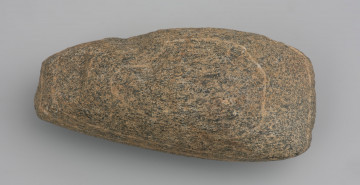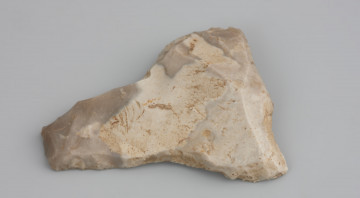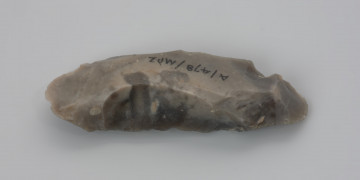
Oringe-type cylindrical axe
5400 p.n.e. — 4100 p.n.e.
National Museum in Szczecin
Part of the collection: Stone Age
The half-finished macro-lithic tool from Unimie, the Łobez district, comes from a site where objects from different Palaeolithic and Mesolithic periods were found in 1931. It is a half-production of the so-called macrolith, a large flint tool used for various types of heavy work, such as woodworking or digging. Macro-lithic tools are wares typical of hunter-gatherer communities of the Mesolithic period, falling within the technological tradition of the period. In the past, they were not given much attention as they were considered undiagnostic objects and thus useless in the study of cultural changes, in contrast to armourers, whose wealth of forms led researchers to prepare very detailed typological-chronological tables, helpful in determining the age and origin of the studied objects. At present, based on manufacturing traces, it is possible to distinguish two basic ways of making macro-lithic tools: according to a specific plan and for ad hoc needs. In many cases, macro-liths made in the same way differed only in how the working part was formed. The tendency is particularly evident among Mesolithic communities using a complex, planned approach to making such tools. The universal nature of macro-lithic technology is well illustrated by the semi-manufactured tool from Unimie. At the stage of production at which it was abandoned, it cannot be determined what type of tool was to be made. It could have been either a pick - a tool like a pickaxe, or a cavil - a kind of axe or punch. The macro-lith half-form from Unimie is fundamental for a fuller understanding of the production of extensive tools during the Mesolithic period. Such finds are scarce, as due to the frugal management of raw materials, makers used every more enormous waste to produce smaller objects.
Michał Adamczyk
Author / creator
Dimensions
cały obiekt: height: 11.6 cm, width: 7 cm
Object type
semi-finished product, tool
Technique
hard masher carving, carving
Material
flint, stone
Origin / acquisition method
acquisition
Creation time / dating
Creation / finding place
Owner
National Museum in Szczecin
Identification number
Location / status

5400 p.n.e. — 4100 p.n.e.
National Museum in Szczecin

9600 p.n.e. — 9000 p.n.e.
National Museum in Szczecin

9600 p.n.e. — 5400 p.n.e.
National Museum in Szczecin
DISCOVER this TOPIC
Castle Museum in Łańcut
DISCOVER this PATH
Educational path